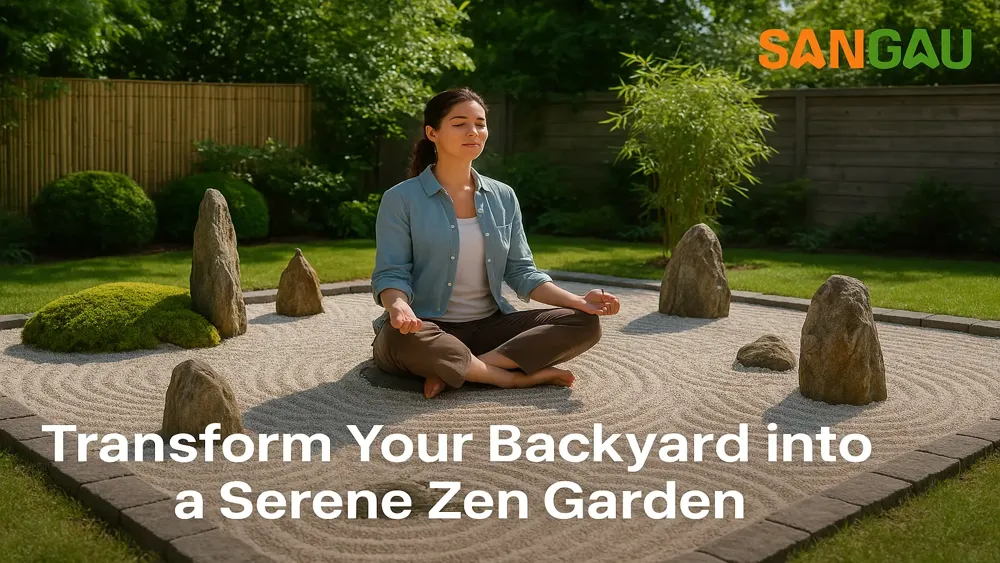Transform Your Backyard into a Serene Zen Garden
Published : 24 Jun 2025

Transform Your Backyard into a Serene Zen Garden
Welcome to a journey of peace and balance!
Imagine stepping into a calming oasis right in your backyard—a place where you can meditate, unwind, and reconnect with nature. A Zen garden, deeply rooted in Japanese culture, offers a tranquil retreat through its minimalist design and symbolic elements. Originally created by Buddhist monks for meditation, these "dry gardens" or "karesansui" use sand, rocks, and carefully placed plants to evoke serenity. In today’s fast-paced world, where stress often takes over, having a Zen garden can be a peaceful escape. Whether you have a spacious backyard or a compact outdoor corner, you can craft your own tranquil sanctuary.
The Philosophy Behind a Zen Garden
At the core of a Zen garden is its minimalist aesthetic, highlighting simplicity, harmony, and balance. Unlike traditional gardens overflowing with colourful flowers, a Zen garden relies on natural elements to create a meditative atmosphere. Every component holds deep meaning—sand symbolises water, rocks represent mountains or islands, and plants signify resilience and growth. The layout encourages reflection, mindfulness, and a sense of inner peace, making your garden more than just a decorative space.
Selecting the Ideal Location
Finding the right location is key to crafting a Zen retreat. Opt for a quiet spot in your backyard where you can experience solitude and minimal distractions. The space doesn’t need to be large—even a small area can transform into a peaceful haven with thoughtful design. A balance of natural light and shade is essential. Avoid areas exposed to extreme sunlight or heavy winds, as they can disrupt the tranquil ambiance. Partial shade works best, offering comfort and protecting delicate elements from weathering.
Preparing the Ground for Harmony
Once you’ve chosen your location, preparation is essential. Clear the area of weeds, debris, and any unwanted plants. Level the surface to create a smooth foundation. If you have a larger space, use stone edging or wooden borders to define the garden’s boundaries and maintain structure. A layer of landscaping fabric beneath the sand or gravel helps prevent weed growth, ensuring your Zen garden remains low-maintenance and pristine over time.
The Foundation: Sand and Gravel
The heart of a Zen garden lies in its sand or gravel, representing the ever-flowing nature of water. Choose fine white sand or light-coloured gravel for a clean, soothing appearance. Spread it evenly across your prepared site, ensuring uniform thickness. Smooth the surface with a rake, creating a blank canvas for intricate patterns. Over time, these raked designs mimic water ripples, enhancing the meditative experience.
The Art of Rock Placement
Rocks are the soul of a Zen garden, embodying mountains, islands, or natural formations. Their placement should be intentional, representing balance and harmony. Choose rocks of varying shapes and sizes to create depth and visual intrigue. For a natural, organic look, place rocks in odd-numbered groups. Some may stand upright, while others lie flat, creating the illusion of a miniature landscape. Remember, open spaces are just as important as filled ones—they bring clarity and simplicity to the design.
Incorporating Greenery with Purpose
While Zen gardens are minimalist, a touch of greenery enhances their appeal. Choose low-maintenance plants that blend seamlessly with the natural aesthetic. Bamboo, moss, and dwarf shrubs are ideal choices, adding subtle beauty without overwhelming the space. Place plants sparingly—perhaps a small moss cluster symbolising an island or a bamboo screen for privacy. Avoid bright, flowering plants, as they may detract from the peaceful, meditative ambiance.
The Symbolism of Zen Elements
Every aspect of a Zen garden carries symbolic significance. Rocks reflect the strength of mountains, the sand symbolises calm waters, and the raked patterns mimic flowing rivers or ocean waves. Together, these elements create a landscape of tranquillity and mindfulness. By thoughtfully integrating these symbols, your Zen garden becomes more than just a visual retreat—it becomes a sanctuary for reflection and personal growth.
The Meditative Practice of Raking
Raking the sand or gravel is both an art form and a meditative exercise. Use a wide-toothed rake to craft flowing patterns that evoke water movement—gentle waves, concentric circles around rocks, or meandering streams. As you rake, focus on your breath and let your thoughts flow freely. This simple yet powerful act fosters mindfulness, helping you stay present and connected to your surroundings.
Maintaining Your Zen Retreat
One of the best aspects of a Zen garden is its low-maintenance nature. However, regular upkeep preserves its beauty and peacefulness. Rake the sand periodically to refresh patterns and remove debris. Trim plants and clean rocks to retain their aesthetic appeal. If weeds appear, remove them promptly to maintain the pristine, meditative space. With just a few minutes of care each week, your Zen garden remains an ever-present sanctuary of calmness.
Why a Zen Garden Enhances Well-being
Beyond aesthetics, a Zen garden provides profound benefits—it fosters relaxation, mindfulness, and mental clarity. Spending time in this tranquil space can reduce stress, improve focus, and promote overall well-being. Whether you use it for meditation, yoga, or quiet reflection, a Zen garden transforms your backyard into a peaceful haven, offering a much-needed escape from the noise of daily life.
Bringing Serenity to Your Space
At SANGAU, we understand the importance of creating harmonious living environments. Our property management services in Bangalore help homeowners design and maintain peaceful outdoor spaces, including Zen gardens that bring tranquillity to your home.
Ready to create your own Zen Garden? Contact us today to learn more about our services and how we can help you transform your outdoor space into a serene retreat.
Hashtags:
#ZenGarden #GardenDesign #Mindfulness #HomeTranquility #SANGAU


